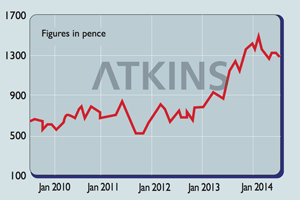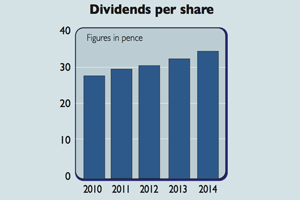Shares in focus: Paving a road to profit
Engineering consultancy firm Atkins is no bargain, says Phil Oakley. Can the business keep growing in the long run?
Get the latest financial news, insights and expert analysis from our award-winning MoneyWeek team, to help you understand what really matters when it comes to your finances.
You are now subscribed
Your newsletter sign-up was successful
Want to add more newsletters?

Twice daily
MoneyWeek
Get the latest financial news, insights and expert analysis from our award-winning MoneyWeek team, to help you understand what really matters when it comes to your finances.

Four times a week
Look After My Bills
Sign up to our free money-saving newsletter, filled with the latest news and expert advice to help you find the best tips and deals for managing your bills. Start saving today!
It'll take a while to build, but start walking it now, says Phil Oakley.
Imagine a world without decent roads, railways, bridges, buildings and the means of getting electricity and clean water into our homes. Most of us take a lot of this for granted and see the people in high visibility jackets and hard hats building these things out in the real world as an everyday occurrence.
Yet before any of these things gets built, somebody has to think about how much they are going to cost, how to design and build them and make sure they get delivered on time and on budget.
MoneyWeek
Subscribe to MoneyWeek today and get your first six magazine issues absolutely FREE

Sign up to Money Morning
Don't miss the latest investment and personal finances news, market analysis, plus money-saving tips with our free twice-daily newsletter
Don't miss the latest investment and personal finances news, market analysis, plus money-saving tips with our free twice-daily newsletter
This is essentially the world of WS Atkins a design, engineering and project management consultancy employing lots of clever people to sort out these complicated projects.
The company has been around for 76 years and has built its reputation as a UK business doing lots of work for the country's road and rail networks. Despite all the talk of austerity and government cutbacks, Atkins has proven to be a very resilient company by spreading itself across different countries and a range of business areas.
Its shares have made some impressive gains during the last 18 months, as the company has set about delivering on a new strategy to make itself bigger and more profitable. That raises the question: has the easy money been made for investors or is there still more to go for?
The outlook
People are its biggest asset. It relies on having top quality individuals across the world to win the consultancy projects that bring the money in. Holding on to good people costs money and is not easy.
Instead of investing money in plant and equipment, like a manufacturing company does, Atkins has to pay its employees enough to keep them on board. However, it mustn't end up becoming like an investment bank and pay them too much so that the shareholders are left with just a few crumbs.
Fortunately, it seems that the management has got this balance right and are now trying to make more money for investors. Trouble is, there are lots of similar companies across the world chasing the same potential contracts.
The good news is that Atkins seems well placed to win more work which should mean more profits in the years ahead. That's because more people are moving to live in cities especially in Asia.
This means more money will have to be spent on infrastructure projects to cater for them. In the Western world, a lot of transport infrastructure needs upgrading whilst many power stations are old and produce too much pollution.
The company has, so far, been very reliant on the UK for the bulk of its income. Here the outlook is still quite promising. The Highways Agency is set to spend more money on Britain's roads over the next decade.
Atkins is also well placed to benefit from some big railway projects happening in the UK, such as the electrification of the Great Western line and high speed rail (HS2). Water companies will still be spending lots of money on their infrastructure and will need help in doing this. The country also needs more airport capacity.
Atkins' strategy, though, is based on generating 75% of its income from outside the UK, compared with around the half it's currently getting now. In order to do this, it has been winning business in the Middle East and buying companies and their expertise in Asia.
The other bright spot for Atkins is its know-how in the energy sector. High oil prices mean that oil and gas exploration companies need help keeping the oil flowing for longer. There's also a big opportunity in nuclear power, as countries look to beef up their energy security.
This means a big focus on extending the life of nuclear power stations whilst keeping them safe. There's also work to do on decommissioning them, as well as designing and building new stations.
The more profitable energy business will be key to Atkins improving its profit margins from their current 7.3%, to over 8%. It is also looking to keep a lid on costs and, in order to do this, is channelling a lot of project work through its Indian centre, where it can increasingly provide the answers to its customers' problems at a competitive price.
All in all, there's quite a bit to like about Atkins. With the exception of quite a big pension deficit (not that surprising in a big people business) its finances look very good and give it some firepower to buy new businesses to help it grow.
If you buy Atkins' shares now, you're placing a bet on its ability to become a much bigger and more profitable business over the next decade and beyond. At nearly 14 times forward earnings, the shares are no bargain and so need to produce higher profits for investors to make money.
I believe Atkins can deliver on that, given the growing demand for infrastructure worldwide. You won't make a fast buck with Atkins but the shares should reward those prepared to take a long-term view.
Verdict: long-term buy
Atkins (LSE: ATK)


Directors' shareholdings
Get the latest financial news, insights and expert analysis from our award-winning MoneyWeek team, to help you understand what really matters when it comes to your finances.
Phil spent 13 years as an investment analyst for both stockbroking and fund management companies.
-
 Should you buy an active ETF?
Should you buy an active ETF?ETFs are often mischaracterised as passive products, but they can be a convenient way to add active management to your portfolio
-
 Power up your pension before 5 April – easy ways to save before the tax year end
Power up your pension before 5 April – easy ways to save before the tax year endWith the end of the tax year looming, pension savers currently have a window to review and maximise what’s going into their retirement funds – we look at how